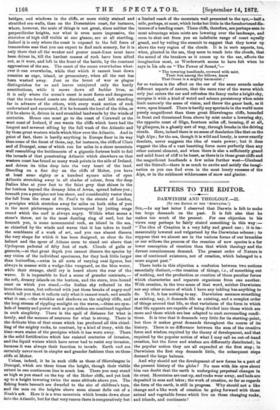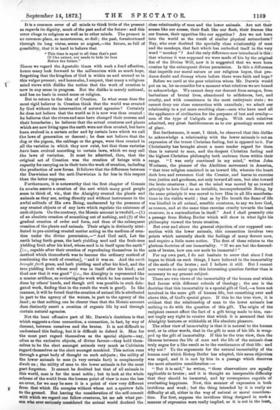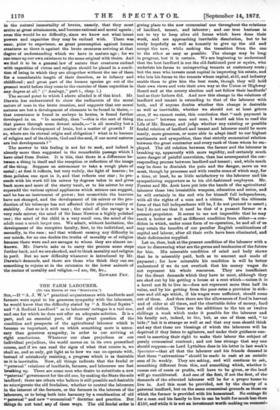LETTERS TO THE EDITOR.
DARWINISM AND THEOLOGY.—II.
[TO THE EDITOR OF THE " SPECTATOR." J
SIR,—In my last letter I observed that Darwin is felt to make too large demands on the past. It is felt also that he makes too much of the present. For one objection to his views may perhaps be fairly stated something in this way :— " The idea of Creation is a very lofty and grand one ; it is im- measurably lowered and vulgarised by the Darwinian scheme ; to suppose that we almost see in the various forms of our brambles or our willows the process of the creation of new species is a far lower conception of creation than that which theology and the devout consciousness demand. The present order of Nature is one of continued existence, not of creation, which belonged to a more august past."
There lurks in this objection a confusion between two notions essentially distinct,—the creation of things, i.e., of something out of nothing, and the production or creation of those peculiar forms which characterise and separate organisms from one another. With creation, in the true sense of that word, neither Darwinism nor any other science of which I have any inkling has anything to do. To it, it has nothing to say. Darwinism assumes something as existing, nay, it demands life as existing, and a complex order of things around that life, so that variations of the form in which that life appears are capable of being divided into those which are more and those which are less adapted to such surrounding condi- tions. It is true that it demands very little for its starting-point, but then it makes great demands throughout the course of its history. There is no difference between the sum of the creative force and wisdom required by the theory of development, and that required by the popular notion of what I may call an out-of-hand creation, but the force and wisdom are differently distributed; in the popular notion they are all expended at the first step ; in Darwinism the first step demands little, the subsequent steps demand the large balance.
And why should not the development of new forms be a part of the present history of the globe ? No man with his eyes about him can doubt that the earth is undergoing perpetual changes in its crust. Mountains are cast up, and rocks wear away, and beds are deposited in seas and lakes ; the work of creation, so far as regards the form of the earth, is still in progress. Why should not a like change and a like work of creation be going forward with those animal and vegetable forms which live on those changing rocks, and islands, and continents ? it is a common error of all minds to think little of the present as regards its dignity, much of the past and of the future : and this error clings to religious as well as to other minds. The present is so common-place, so monotonous, so dull ; the past, foreshortened through its long vistas, seems so august,—the future, so full of possibility, that it is hard to believe that
" This time is equal to all time that's past
01 like extent, nor needs to hide its face
Before the future."
Hence we regard the Apostolic times with such a fond affection, hence many look forward to the millennium with so much hope, forgetting that the kingdom of God is within us and around us in this vulgar present; and hence also, I suspect, that many a religious mind views with dislike the notion that the work of creation is now in any sense in progress. But the dislike is merely notional, and has no basis in sound sense or religion.
But to return to the idea of Creation. In what sense does the most rigid believer in Creation think that the world was created by God without the intervention of oatural agencies ? Certainly he does not believe that the world as it is now was thus created ; be believes that the rivers and seas have changed their courses and their boundaries ; he believes that the actual creatures and plants which are now living upon the earth were not thus created, but have been evolved in a certain order and by certain laws which we call the laws of generation or descent ; he does not believe that the dog or the pigeon, the cabbage or the grape, were thus created in all the varieties in which they now exist, but that these varieties .have been evolved according to certain laws, which we may call the laws of variation. It must be admitted, then, that the .original act of Creation was the creation of beings with a „capacity for carrying on in their turn the work of creation, including the production of new forms. It follows that the difference between the Darwinian and the anti-Darwinian is far less in this respect than the latter supposes.
Furthermore, it is noteworthy that the first chapter of Genesis in nowise asserts a creation of the sort which many good people seem to think of, viz., that the Almighty created the plants and animals as they are, acting directly and without instrument in the awful solitude of His own Being, unobscured by the presence of any created objects or of any laws which regulate the existence of .such objects. On the contrary, the Mosaic account is twofold,—(1) of an absolute creation of something out of nothing, and (2) of the gradual creation of order and form, and then of the subsequent creation of the plants and animals. Their origin is distinctly attri- buted to pre-existing created matter acting as the medium of crea- tion under the divine permission,—"And God said, Let the .earth bring forth grass, the herb yielding seed and the fruit-tree _yielding fruit after his kind, whose seed is in itself upon the earth"
capable after their creation of reproducing themselves in the method which thenceforth was to become the ordinary method of -continuing the work of creation], "and it was so. And the earth brought forth grass, and herb yielding seed after his kind, and the tree yielding fruit whose seed was in itself after his kind ; and God saw that it was good" (i.e., the Almighty is represented like a master-artificer, as reviewing the work which he has caused to be done by others' hands, and though evil was possible in such dele- _gated work, finding that in the result the work is good). In like manner, it will be found that the creation of animal life is attributed in part to the agency of the waters, in part to the agency of the land; so that nothing can be clearer than that the Mosaic account does distinctly assert a creation of organic life by and through .certain natural agencies.
Not the least offensive part of Mr. Darwin's doctrines is that which suggests a close connection, a connection, in fact, by way of descent, between ourselves and the brutes. It is not difficult to understand this feeling, but it is difficult to defend it. Men for the most part regard themselves as the special objects—nay, often as the exclusive objects, of divine favour—they hold them- selves to be the elect amongst animals very much as Calvinists regard themselves as the elect amongst mankind. This notion runs through a great body of thought on such subjects ; the utility of the lower animals to man (a very certain fact) is complacently dwelt on ; the utility of man to the lower animals is for the most cart forgotten. It cannot be doubted but that of all animals in this world, man is far the most noble ; but to look at the whole scheme of the world from the human point of view is none the less an error, for we may be sure it is a point of view very different from that which He occupies without whom not a sparrow falls to the ground. But leaving the consideration of the self-conceit with which we regard our fellow-creatures, let me ask what per- son who ever seriously _eonsidered the animal world doubted the
close relationship of man and the lower animals. Are not their senses like our senses, their flesh like our flesh, their frames like our frames, their appetites like our appetites? Are we not born into the world as the result of similar physical antecedents? Nay, who ever doubted the specially close relationshiii of man and the monkeys, that fact which has embodied itself in the very word " monkey " ? And the only difference now introduced is this : that whereas it was supposed we were made of kin by the original fiat of the Divine Will, now it is suggested that we were born cousins by the subsequent divine permission. Is this a difference that imperils our moral nature or our religious hopes, that pro- duces doubt and dismay where before there were faith and hope?
Before we cavil at the poor relatives whom Mr. Darwin would put on us, let us consider for a moment what relatives we are bound to acknowledge. We cannot deny our descent from savages, from barbarians of brutal lives, abandoned to selfishness, lust, and cruelty, and with consciences in the most embryonic state ; we cannot deny our close connection with cannibals ; we admit our
relationship to a yet more revolting class—men who have used all the appliances of civilisation for the purposes of lust and cruelty—
men of the type of Caligula or Borgia. With such relatives admitted, any great fastidiousness as to our genealogy seems out of place.
But furthermore, it must, I think, be observed that this dislike to acknowledge a relationship with the lower animals is not an expression of the truest Christian feeling, but is opposed to it. For Christianity has brought about a more tender regard for them than is natural to man, and the deepest Christian feeling and the highest Christian philosophy both embrace them within their range. "I was early convinced in my mind," writes John Woolman, the pioneer of the Abolition movement in America, "that true religion consisted in an inward life, wherein the heart doth love and reverence God the Creator, and learns to exercise true justice and goodness, not only toward all men, but also toward the brute creatures ; that as the mind was moved by an inward principle to love God as an invisible, incomprehensible Being, by the same principle it was moved to love Him in all His manifesta- tions in the visible world ; that as by His breath the flame of life
was kindled in all animal, sensible creatures, to say we love God, as unseen, and at the same time exercise cruelty towards the least
creature, is a contradiction in itself." And I shall presently cite a passage from Bishop Butler which will show in what light his philosophy viewed the brute creation.
But over and above the general objection of our supposed con- nection with the lower animals, this connection involves two points which naturally shock the feelings of many devout men, and require a little more notice. The first of these relates to the glorious doctrine of our immortality. "If we are but the descend- ants of brutes, how can our souls be immortal?"
For my own part, I do not hesitate to avow that since I first began to think on such things, I have believed in the immortality of the souls of the brutes ; and I believe it still. But I cannot now venture to enter upon this interesting question further than is necessary to my present subject.
There are two views of the immortality of the human soul which find favour with different schools of theology ; the one is the doctrine that this immortality is a special gift of God,—a boon not involved in the mere gift of human life, but something over and above this, of God's special grace. If this be the true view, it is evident that the relationship of man to the lower animals has nothing to do with the question of this gift. The origin of the recipient cannot affect the fact of a gift being made to him, can- not imply any right to receive that which it is assumed that the Almighty bestows or withholds at His absolute pleasure.
The other view of immortality is that it is natural to the human soul, or in other words, that in the gift to man of his life is wrap- ped up the gift of immortality. If this be the true view, then the likeness between the life of man and the life of the animals does truly argue for a like result as to the continuance of that life: and why not ? To the arguments for the natural immortality of the human soul which Bishop Butler has adopted, this same objection was urged, and it is met by him in a passage which deserves the most attentive consideration :—
" But it is said," he writes, "these observations are equally applicable to brutes ; and it is thought an insuperable difficulty that they should be immortal, and by consequence capable of everlasting happiness. Now, this manner of expression is both invidious and weak ; but the thing intended by it is really no difficulty at all, either in the way of natural or moral considera- tion. For first, suppose the invidious thing designed in such a manner of expression were really implied, as it is not in the least, in 'the natural immortality of brutes, namely, that they must arrive at great attainments, and become rational and moral agents ; even this would be no difficulty, since we know not what latent powers and capacities they may be endued with. There was once, prior to experience, as great presumption against human creatures as there is against the brute creatures arriving at that degree of understanding which we have in mature age ; for we can trace up our own existence to the same original with theirs. And we find it to be a general law of nature that creatures endued with capacities of virtue and religion should be placed in a condi- tion of being in which they are altogether without the use of them for a considerable length of their duration, as in infancy and childhood ; and great part of the human species go out of the present world before they come to the exercise of these capacities in any degree at all." (" Analogy," part i., chap. i.) The second point to which I above alluded is of this kind. Mr. Darwin has endeavoured to show the rudiments of the moral nature of man in the brute creation, and suggests that our moral natures are but a development of elements to be found in theirs,— that conscience is found in embryo in brutes, is found further developed in us. "Is morality, then "—this is the sort of thing that passes through some devout minds,—" is all morality but a matter of the development of brain, but a matter of growth? If so, where are its eternal origin and obligation ? what is to become of religion and of its objects, God and the soul, if our moral natures are but developments ? "
The answer to this feeling is not far to seek, and indeed is already more than suggested in the remarkable passage which I have cited from Butler. It is this, that there is a difference be- tween a thing in itself and the reception or reflection of the image of the thing. Suppose an astronomer to take a rough plate of metal ; at first it reflects, but very rudely, the light of heaven ; he then polishes one spot in it, and that reflects one star ; he pro- ceeds with his work till his mirror by degrees takes in and gives back more and more of the starry vault, or to his mirror he may superadd the various optical appliances which science can suggest, and he has an instrument of power ; but meanwhile the heavens have not changed, and the development of his mirror or the pro- duction of his telescope has not affected their objective reality or stability. Just so is it with man ; the mind of the savage is a very rude mirror, the mind of Sir Isaac Newton a highly polished one ; the mind of the child is a very small one, the mind of the adult man a much larger one. We admit, without hesitation, the development of the receptive faculty, first, in the individual, and secondly, in the race ; and that without causing any difficulty in our minds, for no one doubts the truths of morality or of religion because there were and are savages to whom they are almost un- known. Mr. Darwin asks us to carry the process some steps further back, and we are shocked, and to think morality and religion in peril. But no new difficulty whatever is introduced by Mr. Darwin's demands, and there are those who think they can see something to rejoice at in the extension to the lower animals of the realms of morality and religion.—I am, Sir, &c., EDWARD FRY.




































 Previous page
Previous page